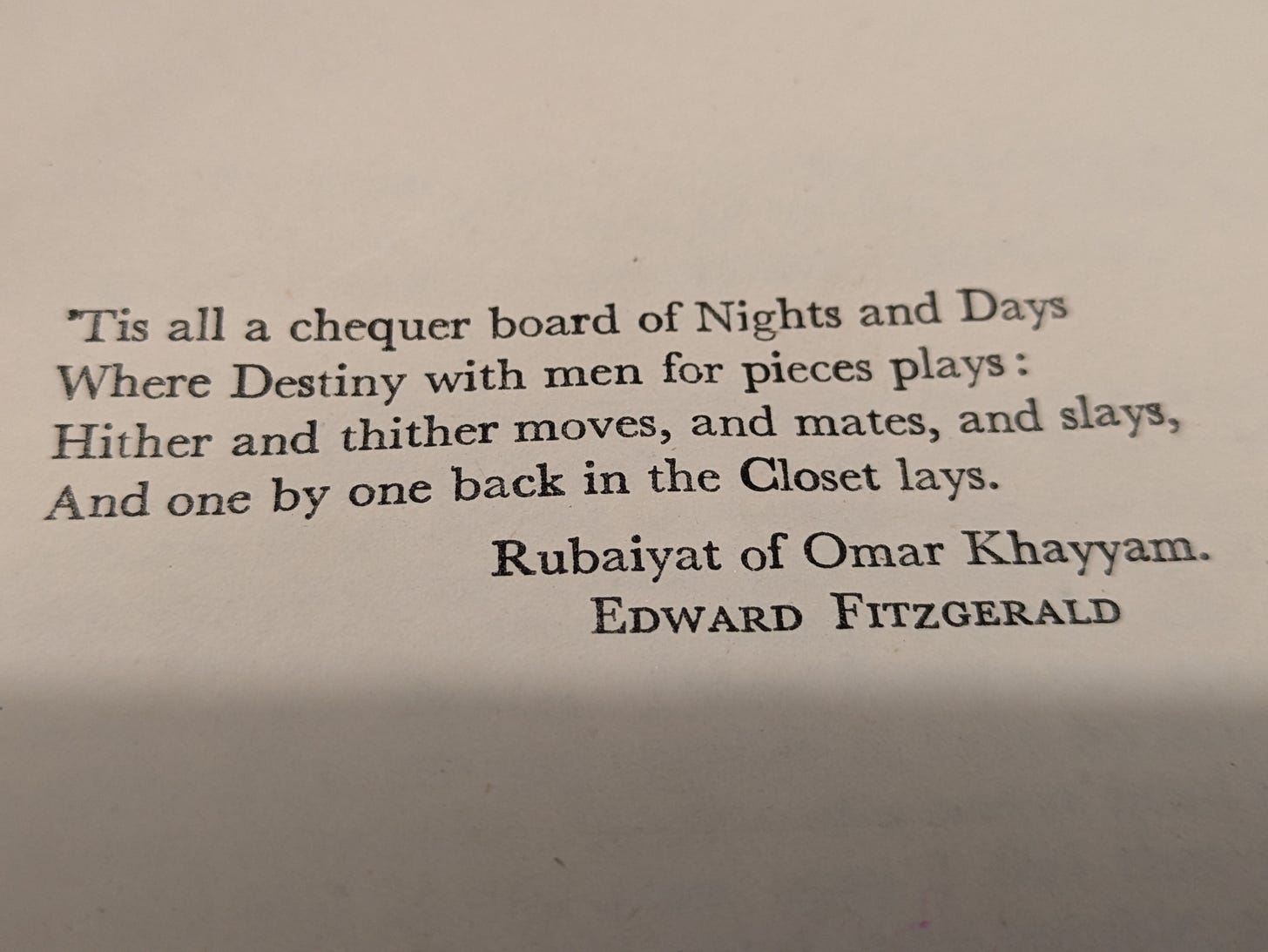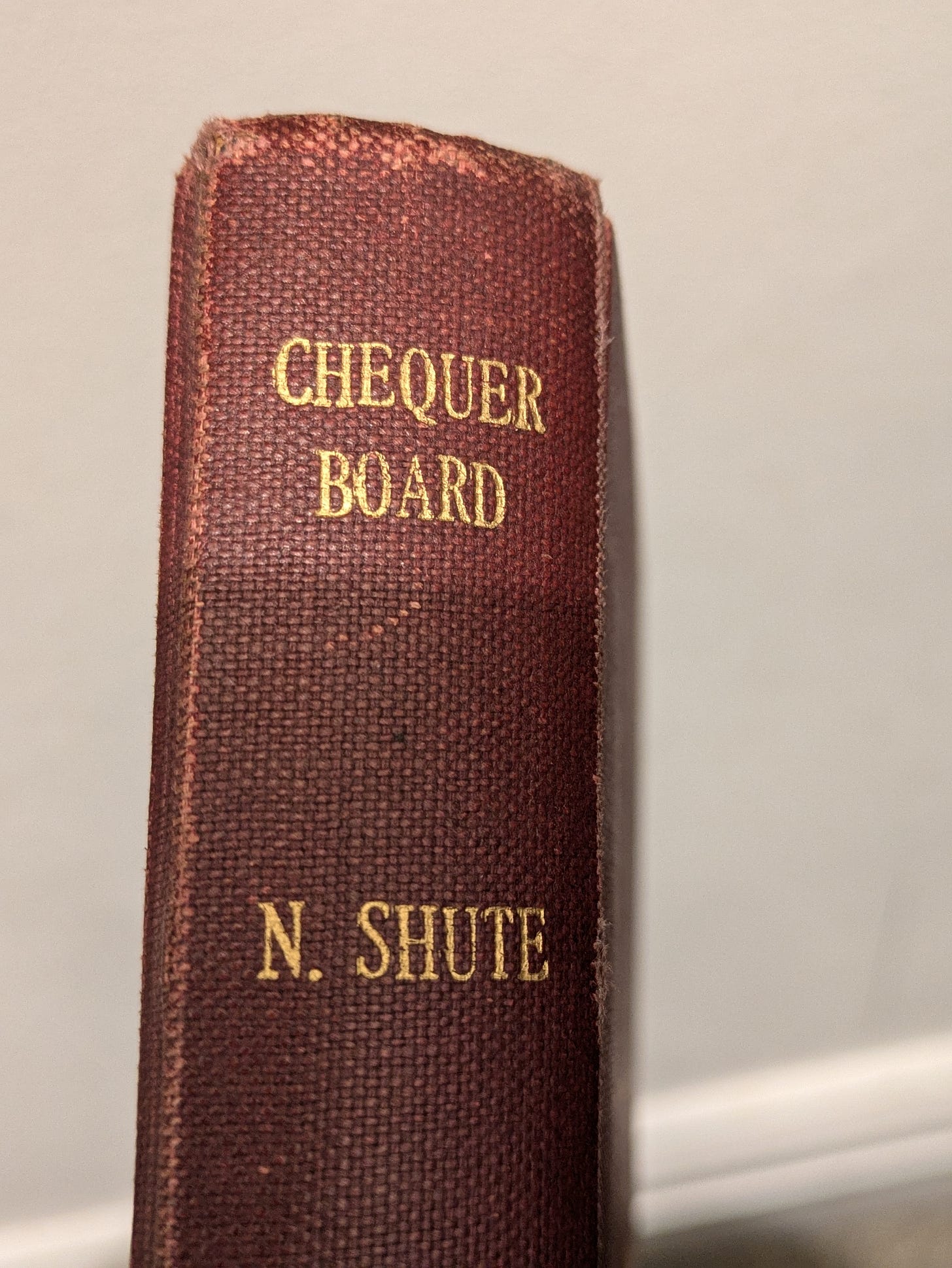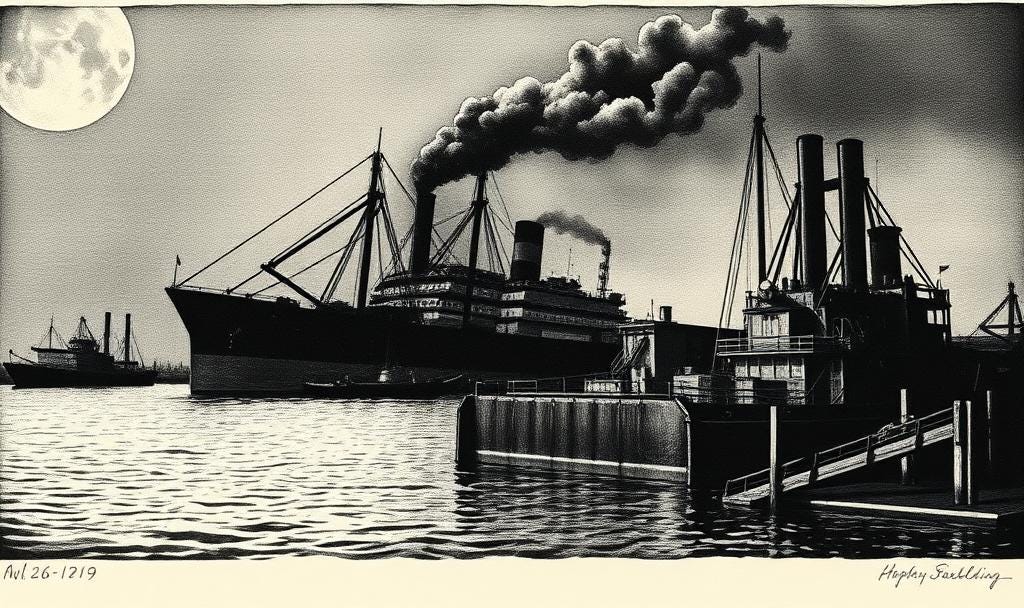Nevil Shute's Chequer Board: love across the racial divide
Period piece, progressive preaching or old-fashioned morality tale?
Chequer Board is the latest of my forays into the novels of Nevil Shute. It’s not my favourite (that’s Trustee from the Toolroom) and on first reading I found it clunky at times and its racial themes heavy-handed. On the other hand, it is much loved by Shute fans (judging by Amazon and Goodreads) and is a brave novel, taking on the theme of interracial marriage, and an ambitious one in scope, ranging from wartime Burma to segregation in the American South.
In fact, when I finished it, I started reading it again for this post and felt I’d misjudged it. Shute has a deceptively simple style. And it was written in the mid 1940s (published 1947) at a time when miscegnation (interracial relationships between blacks and whites) was still forbidden from portrayal by Hollywood’s Hays Code (the movie picture censorship regime that lasted from 1935-1968). It’s bound to be a very different book from, say, Ernest Gaines’ A Gathering of Old Men (1983) or Harper Lee’s To Kill A Mockingbird (1960) or other later classics of race relations. As I reread I found myself wondering if some of it was ironic, as opposed to naive. For example: Shute claiming a black character’s fear of lynchings was based on tales that were mostly “quite untrue” because “such things grow in the telling”: surely naive. But when he states segregation “had always worked well in the Southern states”? Judging from the rest of the book, I strongly suspect that’s tongue-in-cheek.
Either way Chequer Board marks a journey by Shute, and a reassessment of the values in earlier novels. In Ruined City (which I discussed here) I found a very different perspective to interracial relationships which I felt was racist. This was most in-your-face in the matter of the hero’s wife’s affair with an Arab, Prince Ali. I’m going to quote the novel here, and I’m going to go all vapourish and asterisk the racial slur, although to be honest, if you find said word unreadable then you’d better avoid Chequer Board.
“Christ,” he said half aloud. “A ruddy n*** …” In that he was unjust and he knew it; among the six or seven strains that went to make Prince Ali there was no negro blood.
Ouch. It’s a painful passage. Shute is deliberately humiliating his protagonist, Henry Warren, by not only cuckholding him but by making his wife’s lover someone of an apparently “inferior” race: a “black man” as many onlookers smirkingly observe. Shute likes his heroes to be ordinary and relatable, and Henry, a successful merchant banker, had to be brought down to size. So this was an economical way of doing it - just not one that has worn well. It’s worth noting that cross-race relationships and attraction, and the way these can be set against racial hierarchies, have been quite the theme in literature. To Kill A Mockingbird, Passage to India and Paul Scott’s Raj Quartet all spring to mind. All those books, though, were questioning the taboo. By contrast, in Ruined City, Shute seems to be reinforcing it.
Yet in Chequer Board, more than ten years later, he takes a completely different tack. In this novel, Shute is deliberately exploring the potential for love across the racial divide, and shaking a finger at those who might disapprove. It’s even there in the title. The frontispiece of the novel features a quote from the Rubaiyat of Omar Khayyam, but it’s surely more relevant to the story that a chequer board contains black and white squares, intermingled.
An Ordinary Hero
The story of Chequer Board revolves around Mr John Turner, a middle-aged man from suburban Watford, who discovers he has only a year to live. Turner is one of Shute’s “ordinary” heroes: he has a mundane job selling flour, a past conviction for petty crime, a not very satisfactory marriage, and his main enjoyments are the The Barley Mow roadside inn and reading saucy comic strip Jane. I think Shute deliberately sets out to make Turner unattractive in a lower-middle class salesman kind of way, including his appearance (an over-bright suit) and vocabulary (“Cheerio, doctor. How’s tricks?”) Nevertheless, it is a shock to the reader when one of the surgeons treating him says of his fatal prognosis, “I wouldn’t lose much sleep over that … I’ve not got a lot of use for people like Mr John Turner,” and the other replies, “No … They make a lot of trouble and they don’t pay much dividend.” Ostensibly they disapprove of Turner because he was involved in the wartime black market, but it also feels class-coded.
The first sign that Turner is worth more than their assessment comes with his response to his prognosis. Like the best kind of Shute hero, Turner takes disaster on the chin (“it will all be the same in a hundred years”) and he decides to spend his last months seeking out the three servicemen he met in hospital after a plane crash during the war. It was during this crash that he sustained the head injury that is now killing him, and the three men, all in deep trouble in different ways, helped him through that period. He wants to help them in turn.
Turner tells his wife about them: Richard Morgan, a callow young airman in an unhappy marriage; Dave Lesurier, a Black American GI being investigated for attempted rape; and Duggie Brent, on a murder charge after a pub brawl. His quest to find them again takes him to Burma and Cornwall and also helps repair his marriage.
The book is based on some real events and experiences: Shute’s own wartime experience in Burma; and the tension between white and black American soldiers in Britain during the war that erupted at “The Battle of Bamber Bridge” – a violent outbreak in Lancashire where British locals sided with black American servicemen, and one black soldier was shot. Both the story strands involving Richard Morgan and Dave Lesurier involve interracial relationships. In Burma, Turner seeks out Morgan who he has been told is living with a “native” girl: he fully expects that this will be a terrible and demeaning thing. Instead, he finds Morgan successful, happy, accepted by the local culture and married to a charming and well-educated Burmese wife, Nay Htohn.
When Turner then seeks out the black American serviceman Dave Lesurier, he is astonished to learn he is living in Trenarth – the same English village where he was accused of attempted rape during the war. Lesurier had cut his own throat, for fear of the repercussions from his white military superiors, and it was while recovering from this injury and awaiting court martial that he met Turner. However, the incident was not all as appeared. The desperately shy Lesurier had done no more than bestow an unwanted kiss (“It was very naughty of him to do that,” Shute remarks disarmingly) on an inexperienced local girl who then overreacted – as did Lesurier’s superiors, who were looking for ways to crack down on the black troops who, they felt, were too well in with the locals in Trenarth. A sensible American investigator, called in after a local publican sent a letter of protest to General Eisenhower, thankfully saved Lesurier’s bacon, and when Lesurier later returned to seek out and apologise to his accuser, Grace Trefusis, love blossomed.
To Kill A Mockingbird it isn’t, despite some marked similarities of themes (a lawyer of integrity, attraction and accusation across the racial divide, a young girl covering her back via a false claim ). Partly that’s because Trenarth cannot compete with Maycomb – it is just sketched in, as are many of the characters. This means it does feel at times like the novel is simply the vehicle for a simple morality tale. On the other hand, this is Shute’s style of storytelling: the psychology is simple, but when it works the story and characters take on a more universal, if fairytale, feel. Certainly Shute was brave to write it, and to his surprise the novel – which he had feared would offend American readers – sold well in the States, and won critical acclaim from outlets like the New York Times.
Back to Economics
One thing that interested me was whether this more racially benevolent outlook was dependent on a economically prospering world. In Ruined City I argued that the depression backdrop fuelled the insularity and racism. Looking for economic solidarity in hard times across the class divide, as Shute was seeking to do in that novel, meant that national affinities were reinforced and those outside that national community became more suspect. Not everyone agreed with me in the comments but I felt I was onto something.
In Chequer Board there is economic opportunity in plenty, for the characters are rebuilding a war-torn world. Consequently it’s easier to join hands across the divide and in fact, cooperating on economic ventures is often just how this happens. In Burma, the airman Richard Morgan uses his technical knowledge first to restore a train route (this is rather a charming part of the novel, the kind of thing Shute, a former engineer, does so well) by rehabilitating forgotten locomotives, and later a river route, using commandeered Japanese boats. By providing this vital service he wins the friendship of the locals, including his new wife’s family. He’s previously managed to escape from the liberated Rangoon prison, and seek out his new, true love, with the help of a Chinese businessman who is simultaneously chasing the bottom line. The building of a successful life for everyone is tied to restoring the economy.
In war-torn Britain, there are high taxes (a pet hate of Shute’s, and one reason he emigrated to Australia. They are also the reason for Turner’s petty crime). Nevertheless, there is opportunity for the keen and hardworking. Dave Lesurier easily obtains a job as a draughtsman; a position barred to him in the American South. Duggie, who served six months for manslaughter and is now working as a motorbike rider in a circus, is able to get a job as a butcher after a good word from Lesurier’s wife. Both men, despite their chequered pasts, are able to support their young families and look forward to the future with optimism.
In one of the rather heavy-handed reflections on race that feature in the novel, Turner remarks on Dave Lesurier and Nay Htohn:
“You know, there don’t seem to be nothing different at all between them and us, only the colour of the skin. … They got some things we haven’t got too–better manners, sometimes… ”
When his wife responds that Lesurier and Htohn are unusual in being educated:
“That’s so,” he said thoughtfully. “Maybe there’s sense in paying for all this schooling.”
He might also have mentioned the need for a thriving economy.
Shaping Character
In the end Turner does not have to do much for his former friends, but in looking beyond his own immediate fate, Turner achieves a measure of true goodness – or so Shute suggests. For the novel’s openness to cross cultural influences also extends to religion, and in meeting Morgan’s observant Buddhist wife, Nay Htohn, Turner finds spiritual ideas that bring him comfort. He tells his own wife that he is more attracted to the idea of reincarnation than by the precepts of the local vicar. The novel goes farther even than suggesting that Buddhist principles have the power to comfort: Shute has a Buddhist monk draw a horoscope for Turner with startling accuracy – while an affinity with a white cat indicates his spiritual purity and likelihood of ascending in a future life.
There’s yet another strand which is maybe related to this: that concerning Duggie Brent. He’s the one accused of murder - but his lawyer makes the ingenious defence that he has been taught only how to kill: he has become an instrument of war. Again, education (or lack of it) has made him what he is: and has shaped him far more than the colour of his skin,
It all makes for an odd offering: a very mixed bag. Eastern religion, war, cross-racial relationships, a court case, a bit of petty smuggling and roses in suburban Watford, all narrated by a Harley Street surgeon. If, for me, it doesn’t always work – the racial themes are too big for this canvas, the homilies too obvious – all credit to him for trying.
Nevil Shute’s Ruined City: a northern town, the Great Depression, and a maverick merchant banker
In my last post I mentioned Ruined City by Shute as an unlikely companion novel to PG Wodehouse’s Big Money, with a very different style but some similar themes. Here follows a closer look at Ruined City. While it’s not my favourite Shute novel (that would be






